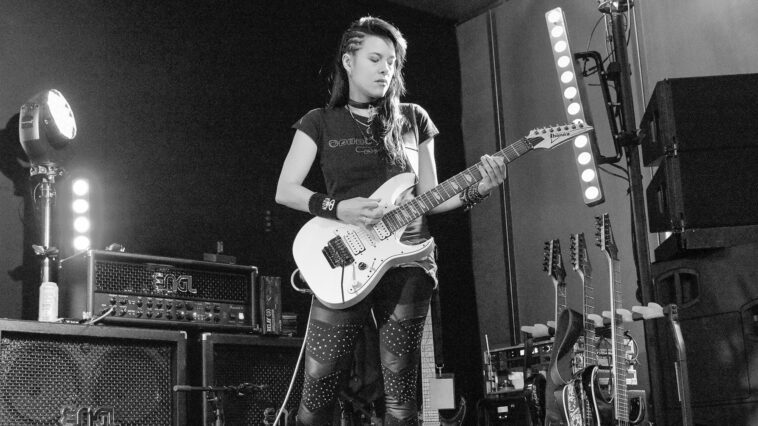Former Evanescence guitarist Jen Majura is leaving her career behind as she steps away from the music industry, citing the emergence of AI as a factor in her decision.
The metal guitarist has had an enviably successful run of it. She joined Evanescence in 2015 and performed on two of the group’s studio albums before leaving in 2022. Since then, Majura has been a featured played on ex–Dream Theater drummer Mike Mangini’s 2023 solo album, Invisible Signsand launched the group How We End with former Nervosa singer Diva Satanica.
But in a new Facebook post, Majura says she leaving it all in the past.
“After careful consideration, observing what‘s going on in the music industry, AI-related developments, and changes in society, I‘ve come to the conclusion to step away,” she writes.
“Instead of wasting another year of my life constantly hoping for new energy, drive, and creativity, I‘ve reached a point in my life where I can confidentially lean back in peace.
“While time allowed me, I was able to collect an amazing amount of beautiful experiences, tours, shows, travels, and moments. I am grateful for every bit of that, but the world has changed. I can confidently make up my mind to stop.”
Majura says she’s open to the possibility of resuming her music career at some time in the future.
“I am not saying that I will never create any music again, whether recorded or live — but for now I feel there are healthier and better things to fill my life with,” she says, “and not deal with the overwhelming amount of ridiculousness that comes with the music industry nowadays.
“I just can’t identify with today‘s attitude and values anymore.”
While there appear to be numerous factors affecting Majura’s actions, AI stands out among them, given the implications for its impact on the music industry. Within just a few years, the technology has shown its potential to both help and harm artists as it changes music’s landscape.
AI’s benefits for music creators have already been seen. Last year, Positive Grid’s Spark Neo smart amp included an AI feature that creates new guitar tones from users’ descriptions, while Presonus Studio One recording software uses AI-powered stem separation to let users isolate tracks from finished, mixed recordings.
Artists and producers have shown ways to use AI productively. Giles Martin employed the technology to “de-mix” the Beatles’ Revolver album in 2021, while Paul McCartney and Ringo Starr used it to complete their Beatles release “Now and Then” with recordings from late members John Lennon and George Harrison.
Alex Van Halen has considered using the technology to create new songs from Eddie Van Halen’s unused riffs and licks and unfinished song ideas. And, in a more humorous vein, Pete Townshend has jokingly threatened to use AI to “write a load of Pete Townshend songs like he used to in 1973” to satisfy fans who can’t move on from the Who’s classic-era songs.
But the greater threat posed by AI to artists’ creative power and income remains first and foremost in musicians’ minds. Campaigns have been launched in the U.K, as well as in the U.S to rally against laws that would require creators to “opt out” if they don’t want their music used in AI learning.
For that matter, labels are now talking with AI firms about changes that could allow the use of their music catalogs in AI learning. To date, musicians and creators have not had a voice in those proceedings, leaving many fearful that their music could be exploited, and they could be left without a voice or compensation.
It was Brian May who predicted in late 2023 that the end of music as we know it was nigh.
“I think by this time next year the landscape will be completely different,” he told Guitar Player. We won’t know which way is up. We won’t know what’s been created by AI and what’s been created by humans.
“Everything is going to get very blurred and very confusing, and I think we might look back on 2023 as the last year when humans really dominated the music scene.”
